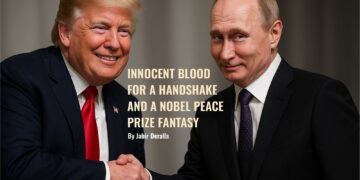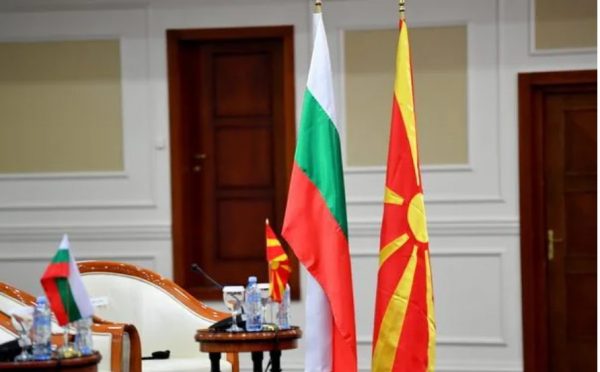Tensions have risen further in recent weeks because Bulgaria has blocked the opening of talks for North Macedonia to join the EU, raising fears it may join Hungary and Poland in their frequent battles with Brussels and fellow member states.
Hristo Ivanov was broadcasting live on Facebook outside a Black Sea villa in July, when three beefy guards pushed him and two other activists into the water. The Bulgarian opposition politician kept on filming when secret service agents threatened to sink the boat that had brought the campaigners to the property known to be used by Ahmet Dogan, one of the country’s leading power brokers. Thousands watched in real time as the police questioned the group headed by Mr Ivanov.
The video, since viewed by more than 1.2m people, sparked weeks of protests across the country against political cronyism. Opponents of Boyko Borisov’s government charge that it is a microcosm of Bulgaria’s problems with corruption and the rule of law, almost 14 years after the country joined the EU.
Mr Borisov’s political difficulties also raise tough questions for Brussels and other EU countries. Critics say they have failed to put sufficient pressure on Sofia to improve governance. Tensions have risen further in recent weeks because Bulgaria has blocked the opening of talks for North Macedonia to join the EU, raising fears it may join Hungary and Poland in their frequent battles with Brussels and fellow member states.
Bulgaria has received billions of euros from the EU since it joined in 2007. Simeon Djankov, a Bulgarian economist and Senior Fellow at the Peterson Institute for International Economics, says the money that has flowed to what is still the EU’s poorest state is part of the problem.
“The EU funds actually increased corruption and state capture,” said Mr Djankov, who served as finance minister during Mr Borisov’s first term, from 2009 to 2013. “In particular, these were used to buy, either directly or through procured projects, much of the media and thus provide a cover for politicians.”
When Bulgaria joined the EU along with Romania, both countries were subjected to special governance monitoring. Bucharest initially made strong progress on fighting corruption, but in 2018 it drew strong criticism from Brussels for an assault on judicial independence mounted by the country’s then ruling Social Democrats. Bulgaria’s troubles attracted less attention, with some diplomats suggesting that Brussels did not want to criticise both members of the class of 2007 at the same time.
“Bulgaria and Romania were for many years kind of given a free pass,” said Mr Djankov. He added that because of the 2008 financial crisis and the 2015 migration crisis, there “has never really been time for the EU to truly think about accession”.
A commission spokesperson said that a report last year found that “Bulgaria has made sufficient progress to meet its commitments at accession to the EU”. However, the spokesperson noted, “it made equally clear that there is still unfinished business”.
But after a change of government in Bucharest in 2019 — and amid growing anxiety about authoritarian drift in central and eastern Europe — the spotlight has shifted to Sofia. In a recent report on the rule of law in Bulgaria, the European Commission raised concerns about non-transparent ownership of the media, pressure on journalists, and new draft legislation on foreign funding of NGOs. In June, the European Court of Justice found a similar law in Hungary to be incompatible with fundamental EU rights.
The commission also reported that “a solid track record of final convictions in high-level corruption cases remains to be established”. It further noted that a “lack of results in the fight against corruption is one of the key aspects raised throughout the summer 2020 protests”.
Bulgaria has consistently been the EU country with the lowest rating in Transparency International’s Corruption Perceptions Index, and it has plummeted in the media freedom ratings since joining the EU. Four-fifths of citizens see graft as widespread.
Prosecutors in the Spanish region of Catalonia are reportedly investigating a money laundering case with possible ties to Mr Borisov, who served as a bodyguard to former Communist dictator Todor Zhivkov before entering politics. The Bulgarian premier has denied the allegations against him. Recently, photographs surfaced of Mr Borisov’s nightstand, showing a pistol on top and wads of €500 notes totalling an estimated €1m. Mr Borisov admits owning a gun but says the photographs were manipulated.
Meanwhile, Mr Borisov’s government is also coming under pressure because of its recent opposition to North Macedonia starting EU accession talks.
“They thought Mr Borisov would steer this process,” said Vessela Tcherneva, director of the European Council on Foreign Relations’ office in Bulgaria. “This puts the European project at risk here in an unprecedented way.”
The Council of Europe’s Venice Commission also recently raised the alarm about constitutional changes, backed by Mr Borisov’s Gerb party, which would increase the power of the general prosecutor and shrink that of both the president and the justice minister. Prosecutor-general Ivan Geshev is regarded as a close associate of Mr Borisov. Bulgaria’s president Rumen Radev has clashed with both men.
Mr Djankov said Brussels is realising the danger posed by Bulgarian corruption too late. “Brussels needs to be convinced that unless something is done now, Bulgaria and Borisov will join the ranks of [Poland’s Jaroslaw] Kaczynski and [Hungary’s Viktor] Orban and be a concern,” he said. “This realisation has been overdue for many years.”
Mr Ivanov of the Black Sea boat escapade told the Financial Times that Mr Borisov has managed to prosper at European level because he has stayed in the conservative mainstream — Gerb belongs to the centre-right grouping in the European Parliament. He does not employ the kind of illiberal rhetoric emanating from Budapest and Warsaw. But now, Mr Ivanov said, Bulgaria is coming to be seen as “part of a larger pattern of corruption and populism which is making its way all too well through the veins of European decision-making”.















